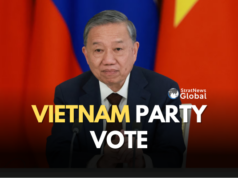NEW DELHI: Locked in a power competition with the United States and in the midst of territorial disputes with many countries, what are China’s global ambitions and what are the means it is deploying to achieve its goals? About 60 experts from nearly a dozen countries put forth their views at a two-day Global Conference on New Sinology (GCNS) organised by Organisation for Research on China and Asia (ORCA),
Roundtables, panel discussions and keynote addresses at the event focused on topics ranging from China’s vision of the world, its evolving foreign policy, its approach to regional and international multilateralism, how it keeps itself and its interests safe, its tech and military footprint in the Indo-Pacific and East Asia, etc.
The opening address by former foreign secretary Shyam Saran focused on navigating India’s way amidst Beijing’s global ambitions. He stressed the significance of global partnerships over territorial boundaries and highlighted the need to evolve our narratives while deepening comprehension of Chinese politics, culture and history. Dr Lance Liangping Gore, a senior research fellow at the National University of Singapore, spoke about the role of the party in foreign policy-making under Xi Jinping. A panel discussed China’s evolving foreign policy, its relations with Europe, its cooperation and conflicts, how India and China used soft power in Africa, how China is positioning itself in West Asia and its defence diplomacy in Asia. Panellists further highlighted how China is looking for a Sino-centric world order and wants to be the voice of the Global South.
A roundtable moderated by Nitin A. Gokhale, Editor-in-Chief of StratNews Global (media partner for the event), focused on China’s military-industrial complex in shaping the 2027 centennial. The panellists discussed how the PLA today is not the party’s army but Xi’s army, how it is focusing on nuclear deterrence and how the state is playing an important role in driving technological developments in the force. Particular attention was given to the PLA Rocket Force, which has shifted its emphasis towards increasing the number of warheads in response to the U.S., thereby restructuring its architecture and incorporating cyber and space capabilities. The discussion also revolved around China’s Air Force and on Chinese shipbuilding capabilities.
A separate panel discussed the India-China border dispute, focusing on China’s maritime interests, regional factors influencing the dispute, the role of airpower, and how it is going to be a long battle.
There was a special address by noted Tibetologist Claude Arpi on ‘Tibet And Buddhism In The Indo-China Complexities’ followed by a special panel discussion on India in the future of the Quad.
The second day of the event focused on 10 years of the Belt and Road Initiative (BRI), Xi Jinping’s pet project that’s drawn flak from several countries, realistic alternatives to Chinese supply chain dominance, the semiconductor ecosystem in India & the global supply chain, and how it is important for India to expand its footprint in Southeast Asia.
While former intelligence officer and China specialist Jayadeva Ranade spoke about China’s intelligence network, Prof. BR Deepak of Jawaharlal Nehru University and Dr Li Nan from the National University of Singapore discussed the state of China’s economy and issues plaguing the Chinese Communist Party.





